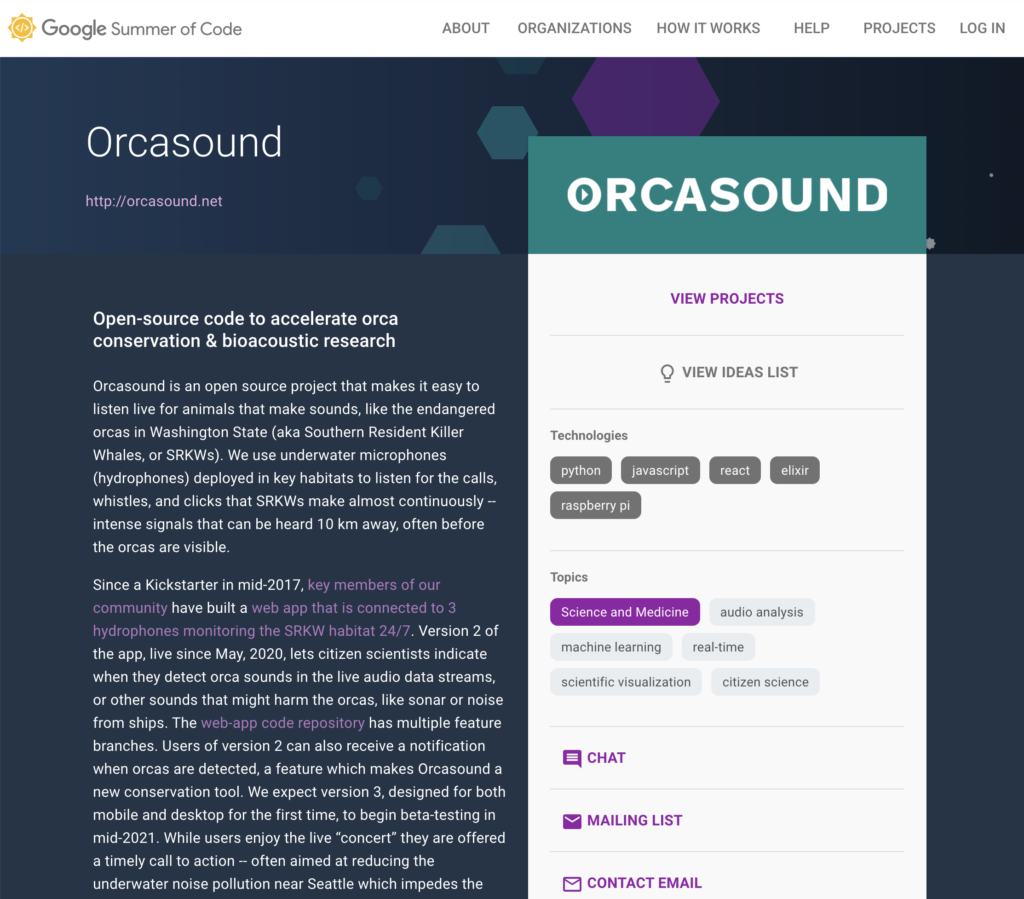Open source software for orcas & coders
Starting in the summer of 2020, Orcasound has been honored to be a host organization for the Google Summer of Code (GSoC), a global initiative to teach current or recent undergraduates about open source software development. Orcasound has already benefited from enthusiastic and talented GSoC students, and we’re excited to see where they lead us. Inspired by the projects they have proposed or advanced, we have provided a growing cadre of volunteer mentors and are incrementally improving our documentation, on-boarding resources, and open data access to support the students.

Key links
- OrcaGSoC repository on Github: README | wiki | issues (project ideas)
- 2022 archive GSoC page | Google photo album | 2022 orcagsoc wiki page
- 2021 archive GSoC page | Google photo album | 2021 orcagsoc wiki page
- 2020 archive: GSoC page | Google photo album | OrcaAL project page at ai4orcas.net
Latest updates
- My GSoC experience working with Orcasound (10/6/2022)
- End of summer musings of a GSoC’22 contributor (9/23/2022)
- Enhanced Passive Acoustic Monitoring (PAM) with Orcanode (9/16/2022)
- Orca call analysis for acoustic separation: final 2 months (9/16/2022)
- Building a bioacoustic source separator to detect orca vocals (8/12/2022)
- Improving the open source Orca Active Learning (OrcaAL) bioacoustic labeling tool (8/10/2022)
- Orca calls analysis for acoustic separation from Ambra (8/8/2022)
- Making hydrophone data accessible (8/4/2022)
Project history
Student and mentor “home” locations (thanks to umap.openstreetmap):
2022
In 2022, Orca Sound accepted four students for our third summer of GSoC:
- Ambra Jin (Italy, UK, Germany)
- Devdoot Chatterjee (India)
- Benjamin Chew (Singapore and Berkeley, CA, USA)
- Karan Mishra (India)
Learn more about their respective projects and mentors at the 2022 orcaGSoC wiki page which includes links to their blog posts, as well as technical details regarding the open source code they contributed. Thanks to a new mentor team with a broad range of backgrounds, in 2022 GSoC contributors were able to work on everything from audio streaming and signal processing to AI algorithms and devops.
2021
In 2021, Orca Sound was able to accept four students for our second summer of GSoC:
- Isabella Macchiavello (Ecuador)
- Dmitry Volodin (Russia)
- Dhananjay Purohit (India)
- Jose Giraldo (from Columbia, working from Spain)
You can learn more about their respective projects and mentors at the 2021 orcaGSoC wiki page. It includes links to their blog posts and technical details regarding the open source code they contributed.
Orcasound was able to double capacity in our second year thanks to a growing team of mentors. Also, for the first time in 2021, the GSoC program significantly altered student eligibility constraints and reduced hr/wk commitment levels by about half in an effort to increase access and enable students to diversify their summer experiences.
You can learn more about their projects and mentors at the 2021 orcaGSoC wiki page.
2020
In our first year, Orcasound worked with two great students:
- Kunal Mehta (India)
- Diego Rodríguez (Mexico)
As a contingency during the emerging Covid-19 pandemic, Kunal and Diego worked together to develop the Orca Active Listening (OrcaAL) tool with a combined mentor team. They also went well beyond the requirements of the summer program, ultimately presenting their work in the first-ever all-remote meeting of the Acoustical Society of America.
In 2021, Kunal is heading to the University of Colorado (Boulder) to earn a Master’s degree in Computer Science. Diego is bound for Switzerland where he will pursue a Master’s program in Sustainable Management and Technology at EPFL.
You can learn more about their projects and mentors at the 2020 orcaGSoC wiki page.
Mentors
The Orcasound GSoC program is possible only because of the heroic voluntary teaching accomplished by our team of talented mentors. We value their commitment to open-source code and to educating younger or less-experienced hackers. You can learn which mentors have worked with which students each year via the orcagsoc wiki. We also acknowledge their contributions of code, tricks-of-the-trade, and wisdom in the Orcasound Hacker Hall of Fame.